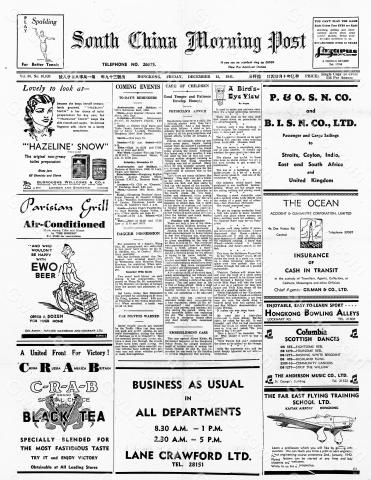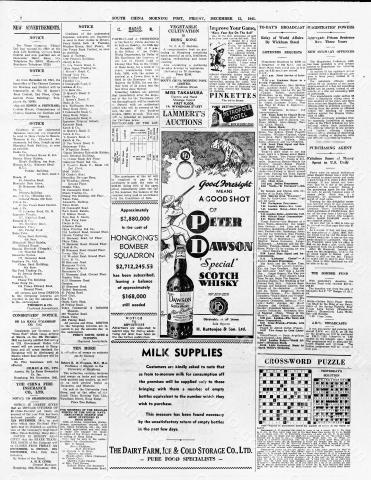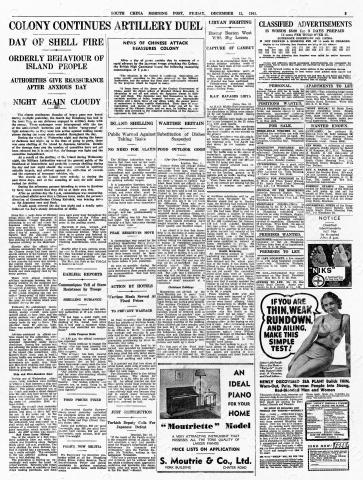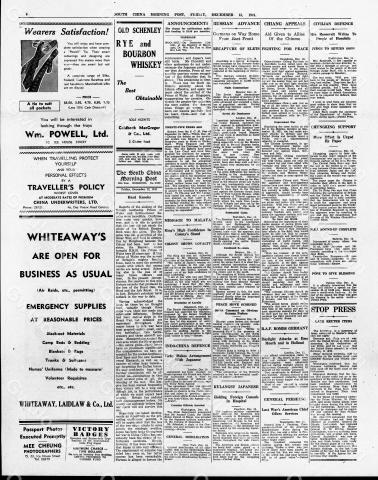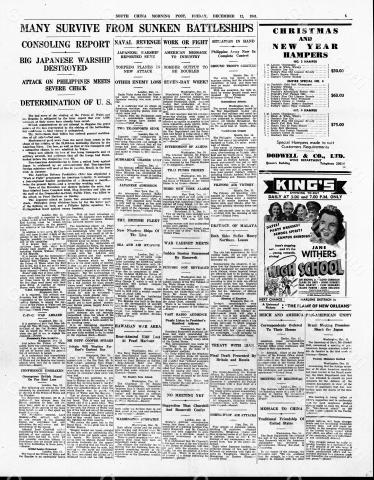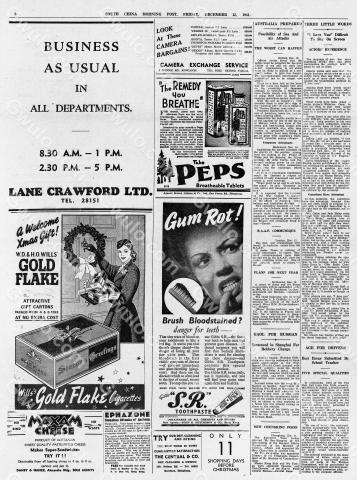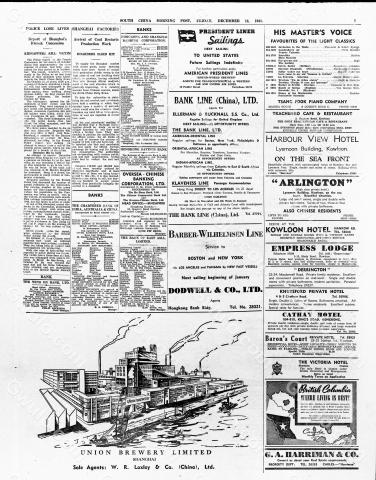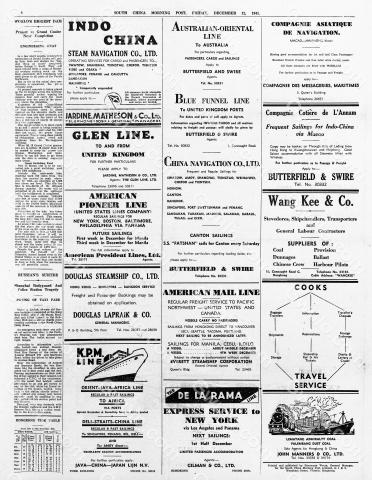For most people in Kowloon the night of December 11-12 is one of terror. Ruthless gangs, some of them armed, descend on private houses and anywhere else that offers the prospect of loot or 'protection money'. Six Irish Jesuits were on that side of the harbour and their history of the hostlities describes the situation vividly
All through the night the din and pillage continued....Gangs 'worked' certain streets or districts. They went to shop after shop and house after house, breaking down the doors if they were not open, and going through every floor and every room swiftly and violently. The slightest resistance brought savage attacks that were often fatal. Ear-rings were torn away brutally; fingers were chopped off when rings did not slip off easily; and a blow with an iron bar was the most common reply to any attempt to bar an entrance. Shots were frequent during the night....None will ever know how many people died during that terrible period.
Those in the hospitals are probably the best off - these offer few temptations to looters when so many other buildings are available. Robert Boris Levkovich is sleeping in the emergency hospital at the Central British School close to the Kowloon Hospital:
There was dead silence around the district, and only the far-away shouts of the mobs, in Kowloon City, and occasional shots were heard.
Father Ryan sums up:
In the history of Kowloon no dawn was ever awaited with greater eagerness than that of Friday, December 12th.
Early in the morning Levkovich is summoned to Kowloon Hospital by Dr. Newton. He is told to join the Rev. Wittenbach and Mr. McGowan on a trip to find petrol and to look for the Rev. Wittenbach's wife and two children. They leave about 8 a.m. but don't get far: they're set upon by a bus-load of Japanese soldiers and become part of the incident involving the Hamsons and the Hardwicks ((see below)).
At 8 a.m. the Hamson family are joined by their friend Mrs. Hardwick and her teenage son Ronnie. They leave in their car for the ferry to Hong Kong Island, passing through a Kowloon that's become 'a ghost town'. They arrive on Nathan Road, where most of the shops have been looted, and which is full of people fleeing in cars or on foot - 'hysterical people clambered onto our car and pulled at the locked doors, trying to get in'.
Suddenly they are surrounded by Japanese soldiers. Arthur Hansom and Ronnie Hardwick are taken aside and Arthur is beaten up. The women and children are told to go. In the confusion of the streets they lose contact with Mrs. Hardwick. Edith and her younger sister Leilah decide to try to join their mother at Kowloon Hospital. They pass sometimes limbless corpses on the way. While climbing a hill leading to the Hospital Edith is attacked by Chinese bandits, Leilah managing to get away with the children (Richard and May). Edith is rescued by the sudden appearance of a group of men, and makes it to the hospital. Leilah and the children have found Mrs. Hamson, and she comes rushing out as soon as Edith arrrives.
Meanwhile, Arthur Hamson and young Ronnie Hardwick, now in a group that includes R. B. Levkovich, are saved from further beatings by a Japanese army doctor. The Jesuit Father Gallagher arrives, along with his associate Mr. McAsey: they've been moving around Kowloon trying, without success, to find a Japanese officer who understands Ireland's neutrality. They're taken to the Kowloon Hospital in a decrepit bus driven by an American named Wilkins, but they're told they'd be in too much danger there, so they're loaded back onto the bus and into some private cars and taken to a building where, they are told, they will spend the night before continuing their journey to a safe place:
The building revealed itself to be an old godown converted into a school.
It turns out to be the Hing Wah College, and, although it's not at all safe, it's where they're going to stay.
In the afternoon, Dorothy Geen, the Matron of Kowloon Hospital, calls the nurses together and tells them the Mainland is being evacuated, but they must stay. ((Miss Geen was to become Matron of Stanley's Tweed Bay Hospital.))
At about 5 p.m. the Japanese begin to occupy the Hospital. That evening Dr. Newton and all the other 'European and American men and women' are told they must leave (Miss Geen and seven sisters seem to remain at the Hospital nevertheless). They are taken to join those at the Hing Wah College in Castle Peak Rd.
Elsewhere in Kowloon, Australian Harold Bateson is shot after surrendering.
There are dramatic events on Hong Kong Island too.
At 2 a.m. F. W. Shaftain, Director of Criminal Intelligence in the police, meets with Triad leaders to try to talk them out of a plan to massacre all the 'whites' in Hong Kong at 3 a.m. on December 13. ((After complex negotiations, involving influential Chinese citizens, a sum of money will be paid and the plan called off. Most people won't know about these events until after the war.))
Air Raid Precautions Warden Noel Croucher comes off duty, and has a snack at the Gloucester Hotel. While he's eating, a yachting friend asks him to take part in a 'secret mission'. He's been on duty all day - it's now past 7 p.m. - so declines on the grounds of tiredness. This decision saves his life.
The mission was to escort the P & O tug Jeanette as it pulled a barge filled with nine tons of dynamite. Through a misunderstanding the dynamite is accidentally exploded in the harbour by shots from men of the Middlesex Regiment and all involved are killed.
That night Aileen Woods is woken by the sound of the explosion of the Jeanette.
So was Noel Croucher:
I had gone along to the Chartered Bank after my meal, pulled two benches together and laid down. About eleven o' clock, I was awakened by a terrific explosion. I thought a bomb had dropped close by, but no further explosions occurred.
The Maryknoll Fathers hear it at their mission in Stanley, which suggests that almost everyone on the island does too.
The situation in Kowloon is dire, but there's good news on the back page of the Daily Mirror:
Chungking radio announced last night that heavy fighting had been in progress for forty-eight hours….The Japanese had suffered heavy casualties, estimated so far at 15,000 with the Chinese forces attacking along the whole front.
Sounds promising. And the Latest News section at the bottom of the page sounds better still:
Chinese Cutting off Japs at Hong Kong
General Chiang Kai Shek is personally directing large Chinese forces coming to the aid of Hong Kong.
Chinese are cutting off the Japanese from rear and flank, and the enemy power is diminishing.
Sources:
Looting: Thomas F. Ryan, Jesuits Under Fire In The Siege Of Hong Kong, 1944, 49
Hamsons: Allana Corbin, Prisoners of the East, 2002, 76-82
Levkovich - silence and petrol mission: Statement, page 3 (in the Ride Papers, held at the Hong Kong Heritage project and kindly sent to me Elizabeth Ride); some details of the 'petrol mission' taken from Dr. Newton's diary, cited in Captive Christmas, 50 - he calls Levkovich 'a third person'.
Gallagher and McAsey: Thomas F. Ryan, Jesuits Under Fire In The Siege Of Hong Kong, 1944, 65-67
Kowloon Hospital entered, Newton: Alan Birch and Martin Cole, Captive Christmas, 1979, 50-51
Bateson: Tony Banham, Not The Slightest Chance, 2003, 64
Geen: Tony Banham, Not The Slightest Chance, 2003, 61
Shaftain: Tony Banham, Not The Slightest Chance, 2003, 59
Croucher, Woods: John Luff, The Hidden Years, 1967, 49-50
Jeanette: Tony Banham, Not The Slightest Chance, 63.
Note 1:
John Luff (and Phyllis Harrop in Hong Kong Incident, 73) dates the Jeanette explosion to the night of December 11, but I have followed Tony Banham's December 12 dating. Wright-Nooth seems to put the 'monstrous explosion that shook the whole of Victoria' on the night of December 14 (Prisoner of the Turnip Heads, 53).
Note 2:
Captain Freddie Guest claims that he and others made up a rumour about a Chinese army marching to the relief of Hong Kong in order to cheer people up when 'about December 17' they were forced to finally release news of the sinking of the H. M. S. Repulse and H. M. S. Prince of Wales and thus crush hopes of naval relief from Singapore. However, reports in the UK press prove that the rumour pre-dated the 17th. There was a Chinese army marching towards Hong Kong, although there was never any prospect of it arriving in time to relieve the Colony. The press reports in Britain seem to have been based on real but not always accurate reports from Chungking of the movements of this army. It would, for example, have been correct to say that Chiang Kai-Shek had directed forces to come to Hong Kong's aid, not suggest that he was directing them in action.
See Freddie Guest, Escape From The Bloodied Sun, 1957, 39 and Philip Snow, The Fall of Hong Kong, 2003, 63
